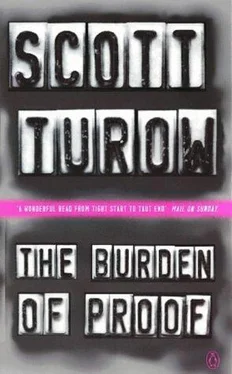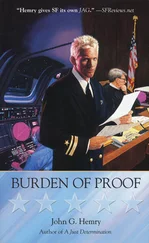Scott Turow - The Burden of Proof
Здесь есть возможность читать онлайн «Scott Turow - The Burden of Proof» весь текст электронной книги совершенно бесплатно (целиком полную версию без сокращений). В некоторых случаях можно слушать аудио, скачать через торрент в формате fb2 и присутствует краткое содержание. Жанр: Детектив, на английском языке. Описание произведения, (предисловие) а так же отзывы посетителей доступны на портале библиотеки ЛибКат.
- Название:The Burden of Proof
- Автор:
- Жанр:
- Год:неизвестен
- ISBN:нет данных
- Рейтинг книги:3 / 5. Голосов: 1
-
Избранное:Добавить в избранное
- Отзывы:
-
Ваша оценка:
- 60
- 1
- 2
- 3
- 4
- 5
The Burden of Proof: краткое содержание, описание и аннотация
Предлагаем к чтению аннотацию, описание, краткое содержание или предисловие (зависит от того, что написал сам автор книги «The Burden of Proof»). Если вы не нашли необходимую информацию о книге — напишите в комментариях, мы постараемся отыскать её.
The Burden of Proof — читать онлайн бесплатно полную книгу (весь текст) целиком
Ниже представлен текст книги, разбитый по страницам. Система сохранения места последней прочитанной страницы, позволяет с удобством читать онлайн бесплатно книгу «The Burden of Proof», без необходимости каждый раз заново искать на чём Вы остановились. Поставьте закладку, и сможете в любой момент перейти на страницу, на которой закончили чтение.
Интервал:
Закладка:
"To protect the innocent."
"Oh, sure," said Dixon. All things considered, especially given the havoc of a few days ago, he was taking this with stoical calm. But he was, after all, a person Of considerable strength. There was no point in not admiring Dixon. He was one of those fellows Americans had always loved. Dixon had come from one of those bleak Illinois coal mining towns near the Kentucky border. Stern had paid his college and law school bills by driving a punchboard route throughout the Middle West, and when he was out on the road in the riffles, Stern had seen these towns-colorless, square, plain as the prairies, the air sooted with coal dust-placed amid the sensuous pink forms of the earth which had been stripped and raised in the search for coal.
Dixon's father was a German immigrant, a Lutheran minister, a spare, unforgiving, tight-fisted type who had died when Dixon was nine. The mother, sweet-natured but easily trod upon, had depended unnaturally on her son. Stern had not learned any of this from Dixon, but only from his relatives, the spinster aunts and one warmhearted cousin who spoke with admiration of Dixon's early sense that he was destined for more than the numb labored slavery of the coal town.
Behind Stern, the intercom buzzed. No answer at the U.S.
Attorney's Office, Claudia announced. It was two in the afternoon, but the prosecutors answered the phone only when they wanted to. Keep trying, Stern told her.
"One other thing we must determine," he said to Dixon, "is how the government came to launch their investigation. We must try to identify the source of whatever allegations they have decided to examine."
"You mean, who fingered me?"
"If you are the target, yes. When we know who spoke against you, we will have some insight into the limitations on the government's information. Have you any idea?"
"Not a clue," said Dixon succinctly, letting his hands flutter up futilely. No doubt he had half a dozen areas in mind where the government might question him, but he would never share any of that with Stern, who would hector him about correcting each infraction. "Probably the compliance people from the Exchange," said Dixon at last. "They're always bitching to someone about me." The suggestion sounded halfhearted, at best.
The telephone rang: Stern's inside line, a different tone, like a cricket. Only his family had this number; it was Clara whom he would generally expect. That reflex rose in him and foundered while he absorbed the second ring.
"Sender?" asked his sister. A welcome voice. Stern's love for Silvia was like his feelings for no one else-purer,. less burdened. She had been seventeen when their mother died, and Stern, five years the elder, had assumed that his role toward her would become somewhat parental, but their nods, like everyone's, had been less predictable than that.
They looked after one another; they filled in what was lost. Stern and his sister, by the habit of a lifetime, spoke each day. Their conversations lasted barely a minute.
'So, busy?" 'Yes, of course. You?" They spoke of their health, the children, the whirlwinumb labored slavery of the coal town.
Behind Stern, the intercom buzzed. No answer at the U.S.
Attorney's Office, Claudia announced. It was two in the afternoon, but the prosecutors answered the phone only when they wanted to. Keep trying, Stern told her.
"One other thing we must determine," he said to Dixon, "is how the government came to launch their investigation. We must try to identify the source of whatever allegations they have decided to examine."
"You mean, who fingered me?"
"If you are the target, yes. When we know who spoke against you, we will have some insight into the limitations on the government's information. Have you any idea?"
"Not a clue," said Dixon succinctly, letting his hands flutter up futilely. No doubt he had half a dozen areas in mind where the government might question him, but he would never share any of that with Stern, who would hector him about correcting each infraction. "Probably the compliance people from the Exchange," said Dixon at last. "They're always bitching to someone about me." The suggestion sounded halfhearted, at best.
The telephone rang: Stern's inside line, a different tone, like a cricket. Only his family had this number; it was Clara whom he would generally expect. That reflex rose in him and foundered while he absorbed the second ring.
"Sender?" asked his sister. A welcome voice. Stern's love for Silvia was like his feelings for no one else-purer,. less burdened. She had been seventeen when their mother died, and Stern, five years the elder, had assumed that his role toward her would become somewhat parental, but their nods, like everyone's, had been less predictable than that.
They looked after one another; they filled in what was lost. Stern and his sister, by the habit of a lifetime, spoke each day. Their conversations lasted barely a minute.
'So, busy?" 'Yes, of course. You?" They spoke of their health, the children, the whirlwind of life. Today she said immediately, "Back at work. This is good, I believe."
"The best alternative." He covered the receiver and to Dixon mouthed"Silvia." He was not certain if Dixon would want her to know he was here, but his brother-in-law pointed to himself to indicate that he' would like to speak with her when Stern was finished. Stern told her they were together.
"Discussing this stupid business of the other day?"
"Just so."
She emitted a sigh of sorts but made no further inquiry.
His sister and he rarely engaged in any lingering discussions of Dixon, neither the rough and smooth of her marriage nor her husband's complex business affairs. That was more or less the compact of thirty years ago, when Stern had so vehemently opposed their marriage. He had cited religious differences, but only as the best excuse.
How could you tell your sister that this fellow who called himself your friend had the sharp look, with his doublebreasted suits and pomaded hair, of a carnival barker? In those days, Stern would have wagered that Dixon would be gone when the circus left town. But he'd had greater staying power than that. He was brighter than Stern was willing to acknowledge, and more industrious. And perhaps America was a place where virtue was less spontaneously rewarded than Stern-and everyone else-had believed in those days.
"Matters are well in hand," said Stern simply. They spoke briefly of each of his children, and with that done, he extended the phone to Dixon, who spent a few moments chatting happily with his wife. In his own fashion, Dixon was luxurious. He was covetous of Silvia's beauty and loved to see her pampered and expensively dressed. Roses arrived for her every Friday, and you could not walk down the street with Dixon without him spying some item in a rich store window that he decided would look smashing on Silvia.
He was oddly preoccupied with his wife; if Silvia had a cold, it was on Dixon's mind. He called her four times a day. Yet this same doting husband had hot pants when any female between the ages of fifteen and sixty-five passed by, and he was always in pursuit.
"Now work hard," said Silvia to Stern when Dixon handed back the phone.
Her efforts at humor were inevitably awkward. And in this case she was only trying to mask her real concerns. Silvia, for all her occasional anguish, remained enthralled by Dixon, as dazzled as she had been as a sorority girl. His swagger embarrassed her at moments; his wandering broke her heart. But he remained her life's romance, a figure the size of a monument, the man who still seemed to her half a dream.
"Well in hand," said Stern again, but, having Spoken, felt momentarily put out with himself. With work of this kind, it was his practice never to predict favorable outcomes.
Читать дальшеИнтервал:
Закладка:
Похожие книги на «The Burden of Proof»
Представляем Вашему вниманию похожие книги на «The Burden of Proof» списком для выбора. Мы отобрали схожую по названию и смыслу литературу в надежде предоставить читателям больше вариантов отыскать новые, интересные, ещё непрочитанные произведения.
Обсуждение, отзывы о книге «The Burden of Proof» и просто собственные мнения читателей. Оставьте ваши комментарии, напишите, что Вы думаете о произведении, его смысле или главных героях. Укажите что конкретно понравилось, а что нет, и почему Вы так считаете.












